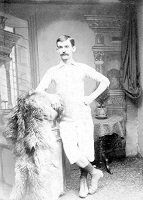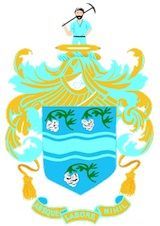
Fergus Suter


You may in reading other sections of this blog have become aware of the profound scepticism, with which in it the recording of the history of World football is viewed, notably how and through whom it has become a global game. The contention, backed by a decade's research, which still goes on, is that, whilst Association football is of southern English origin, its driving force from a decade after its conception and for the next sixty years to the 1930s, the 1960s in England, has been Scotland and Scots. Working-class, World and modern football all came from our shores. Without us the dominant game may have been rugby, or perhaps nothing. Yet conventional history, as written not by Scots, said something else and contemporary football writing, both in the Press and academic, largely continues, whilst simultaneously ignoring or avoiding up-dated research of the reality or understanding of underlying actual, basic and base, drivers. social and very much economic, to perpetuate the deceit.
And this is shown not only by misunderstanding, bordering at times on misrepresentation, of not just events, but ideas and even people.
In the first category is, for example, 1888 and the almost obliteration of the nascent Pyramid (2-3-5) up to and most importantly including the Chapman era at Arsenal, in the second football tactics of today globally and in the third perhaps Fergus Suter. However, this previous allowance of the predominance of false history has now been challenged and largely through technology. That challenge began at the end of the last century with the foundation of organisations like American and Mormon Ancestry.com. Of course, then it was not on-line but distributed by CD-ROM. Nor was it international. That in reality came about still less than a decade ago. And in the case of Scotland it was much the same. Whilst our Scotland's People came into being in 2002, it only became digitally-searchable in 2016, a development, which changed the historical landscape to the point of allowing in the interim of less than a decade certainly correction, even cancellation and replacement, of earlier versions of history itself, the history of football included, and therefore their interpretations.
So back to Fergus Suter as a case-in-point. The story was that he made his way from Glasgow to play, indeed teach, football to the North Lancastrians, first at Darwen and then in Blackburn. As such he was regarded as one of the first of the "Scotch Professors" handing on knowledge, for a financial consideration, be it actual or in-kind. However, the term Scotch Professor seems to have been lifted, firstly, from a cartoon caption and in an all-seriousness that was perhaps mistaken. What we know now introduces at least an element of Scottish irony, bordering on "Aye, an tha'al be reet, ya ken", which, if anyone knows Scots, means precisely the opposite.
At this point I must refer you to the piece written as far back as 2016 by the inestimable Andy Mitchell in his blog, Scottish Sport History, which looks at the arrival of Suter and of Jimmy Love, previously both of the Partick club, note, not today's Partick Thistle. The date is important because Mitchell was one of, if not the first to employ the new, just on-line, technology in historical research and utilise it with both understanding, from previous work, and precision. Now both Suter and Love went South with at least something of the Scottish football of the time, which was already proving far superior to the English and lately Welsh versions of the game and would continue to do so for at least another decade. But Partick was far from being one of the top Scottish teams. It had come into being in 1875 as one of a wave of smaller teams that had followed on from the founding events of the Scottish game in 1872. It was defunct by 1885. Suter himself, one of three eventually footballing brothers, the elder Edward, the younger Jarvis, "Jerry", is said to have come from rugby and had by 1877/8, the pivotal year in question, at best two years experience of the organised game. Moreover, Jimmy Love was a year younger in age so probably had less experience still. And, of course, each had background.
For both it was that they had been in the Partick team that had been invited, through a Darwen-man working in Scotland being one of their team-mates, to play Darwen F.C. It was the third such encounter, home and away, and had taken place on 1st January 1878. So the Partick players knew the town. For Love there was also the small matter, by the time on 9th November 1878 of a return to North Lancashire, this time to play Blackburn Rovers, of being back in Glasgow about to be declared bankrupt. Remaining in Lancashire avoided the problem for the moment and would allow him then to move on further, joining the army and sadly leading to his death two years at the age of just twenty-four of fever in Egypt.
And in Suter's case too technology allow the revelation of more than meets the eye and from it further re-evaluation. The Suter family had come from Ireland but of the parents only Fergus's mother, Catherine, was Irish-born. His father, David, stone-mason to trade, as Fergus would be also, had been born in England, albeit of Scottish parents. In fact he had actually been born, coincidently or not, in Lancashire itself, in Prescot, between Liverpool and St. Helens. As a man leaving Scotland in his twenties David's father with mother moved South and then moved on, back to Glasgow then to Ireland. Indeed David himself with his family would also move back and forth between Ireland and Scotland. Edward Suter was Irish-born. Fergus and Jerry were not.
So we find that in 1875 on the foundation of Partick Fergus Suter, born in 1857, was seventeen. On the 9th November 1878 he was twenty, but crucially it was just two weeks before his twenty-first birthday and the then age of maturity. Moreover, whilst his parents were both alive, his father has T.B. and would be dead within the year. There was frankly not much hold young Fergus in Glasgow and, I would suggest, on the day he turned twenty-one arrangements could already have been made to allow him to remain in Darwen and he made up his mind the following basis. Whilst his age and level of experience meant he was barely a student of the game never mind a professor, the footballing bar in Darwen was clearly low enough for it to be believed that he added something to its team. It also beat stone-masonry with the further probable truth being that in his case it allowed both time and opportunity literally to keep ahead of the game and other players enough to have two seasons at Darwen and also nine more at Blackburn Rovers.
And with regard to the switch to Blackburn in the summer of 1880 the new technology of enquiry also plays a part, impossible to imagine in its forensic-ness before its availability, again re-writing the narrative. A Suter family story, as once more Andy Mitchell pointed to as rewriting of this story and football-history more generally began in 2016, has it that before his marriage in Blackburn in 1883 he had an illegitimate child with a Darwen girl. The girl was Eliza Wood and she was actually from Eccleshall in Staffordshire, but working locally. In 1881 she is recorded as a "General Domestic Servant" for the Lightbown couple, he a local linen and cotton manufacturer, at Falcon House, Lower Darwen. However in March that same year, so at much the same time, she gave birth in Stoke-on-Trent to a boy, John, no father registered, who would be brought up by his grandparents in Eccleshall and seemingly live out the rest of his life in the county. Simple counting would both indicate Lizzie would have become pregnant in June 1880, perhaps enough for Suter to be ungallant enough to up and leave, admittedly not far from the scandal but far enough, leaving "Lizzie" perhaps to move to Manchester, have a second child, a daughter, Mary, again probably illegitimate, work as a "widowed" dressmaker and then disappear from view but with wee Mary marrying and dying, both, again coincidentally or not, back in....Stoke-on-Trent.
